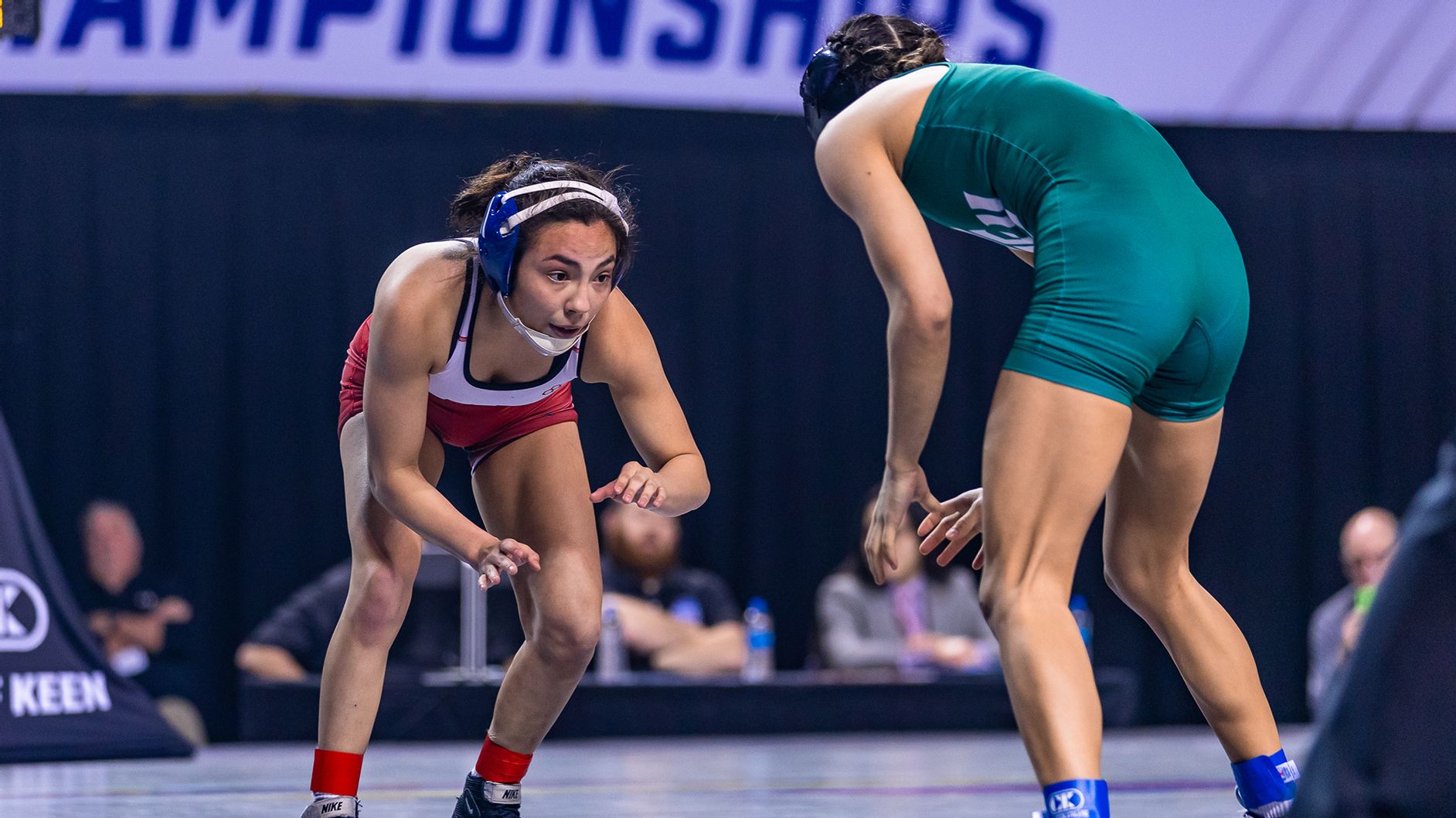
Women’s Wrestling Moves Toward NCAA Championship Status, Projected for Winter 2026
By Corbin McGuire
NCAA
Women's wrestling on Wednesday took a big step toward becoming the 91st NCAA championship sport, with its projected first NCAA championship occurring in winter 2026.
The NCAA Committee on Women's Athletics voted at its meeting Wednesday to recommend Divisions I, II and III sponsor legislation to add a national collegiate women's wrestling championship. The Association-wide committee oversees the Emerging Sports for Women program, which includes women's wrestling.
"We are excited to recommend women's wrestling as the 91st NCAA championship sport," said Ragean Hill, chair of the Committee on Women's Athletics and executive associate athletics director/senior woman administrator at Charlotte. "We are extremely proud of the work that USA Wrestling has done to make this a reality in such a short period of time. Also, a special thank you to the men's wrestling community for believing in our young women and championing this process."
Following the committee's recommendation, the projected timeline to add a women's wrestling championship is:
Each division is expected to review the recommendation and sponsor a proposal by its respective 2024-25 legislative cycle deadline.
The recommendation also includes establishing a Women's Wrestling Committee, which would begin its work in January 2025, to allow time to prepare for a championship in winter 2026.
If sponsored, the divisions are expected to vote on the proposals during the 2025 NCAA Convention in Nashville, Tennessee, Jan. 15-18.
If adopted on that timeline, the first women's wrestling championship would be held in winter 2026.
Before a women's wrestling national collegiate championship can be established, funding must be considered by the appropriate financial oversight committees among other competing priorities during the relevant annual budget development cycle.
These required next steps and timeline are consistent with past sports added as national collegiate championships through the Emerging Sports for Women program.
"USA Wrestling is excited that the NCAA Committee on Women's Athletics has recommended women's wrestling to become an official NCAA championship," said Rich Bender, executive director of USA Wrestling, one of the national governing bodies of women's wrestling. "As part of the coalition of wrestling organizations that has supported women's wrestling through the NCAA Emerging Sports for Women process, this is a huge milestone for our sport and for our NCAA women student-athletes. We look forward to working with the NCAA leadership in the coming months during the approval process, with the goal of having the first NCAA Women's Wrestling National Championships in the 2025-26 season."
If approved by NCAA members, women's wrestling will become the sixth sport to earn NCAA championship status through the Emerging Sports for Women program, established in 1994 based on a recommendation from the NCAA Gender Equity Task Force. It would join rowing (1996), ice hockey (2000), water polo (2000), bowling (2003) and beach volleyball (2015).
"Wrestle Like a Girl is thrilled that the NCAA Committee on Women's Athletics has recommended women's wrestling to become an official NCAA championship sport," said Sally Roberts, CEO of Wrestle Like a Girl, one of the national governing bodies of women's wrestling. "This momentous occasion further empowers women in sports and brings us closer to fulfilling the promise made 51 years ago with the passage of Title IX. With the many battles won, women's wrestling will be rightfully enshrined with dignity and recognition as an NCAA championship sport for women. It is a victory for all the athletes, supporters and allies who have worked passionately to make this dream a reality. The tireless efforts have paid off, and we are proud to stand with our sisters in sports to celebrate this accomplishment. This is a significant step forward in women's empowerment, and we are honored to be part of it."
Before the committee can make a recommendation to add a championship for an emerging sport, 40 schools must sponsor it at a varsity level and meet the sport's minimum competition and participant requirements. Women's wrestling, which became an emerging sport in 2020, eclipsed that number in the 2022-23 academic year.
"The rise in sponsorship and participation numbers for women's wrestling is yet another proof point of the rapid growth of women's sports. The sport is also a growing Olympic pipeline, helping produce multiple medalists at the 2020 Games," NCAA President Charlie Baker said. "The NCAA is excited to continue investing in the sport to help it grow and provide more opportunities for student-athletes."
Added Maddie Avila, a sophomore women's wrestler at North Central (Illinois): "I think it represents our hard work — all the blood, sweat and tears that we've put into this sport. We have to put countless hours into this sport, and we are working just as hard as the men, so it will be really awesome, for women's sports in general, to have women's wrestling represented by the NCAA at the championship level."
According to the latest sports sponsorship and participation data, nearly 800 student-athletes competed in women's wrestling across 51 teams in 2022-23. More than 70 schools reported that they intended to sponsor the sport for the 2023-24 academic year.
College women's wrestling also boasts a diverse student-athlete population. Per NCAA demographics research, 43% of the student-athletes on women's wrestling rosters are minorities, which is tied for the fourth-highest percentage among NCAA women's sports.
Current NCAA women's wrestlers compete in a season-ending national competition that is organized by the coalition of wrestling organizations. The National Collegiate Women's Wrestling Championships are set for March 8-9 in Cedar Rapids, Iowa.
Five other sports are currently in the Emerging Sports for Women program: acrobatics and tumbling, equestrian, rugby, stunt and triathlon. Learn more about them and the program here.